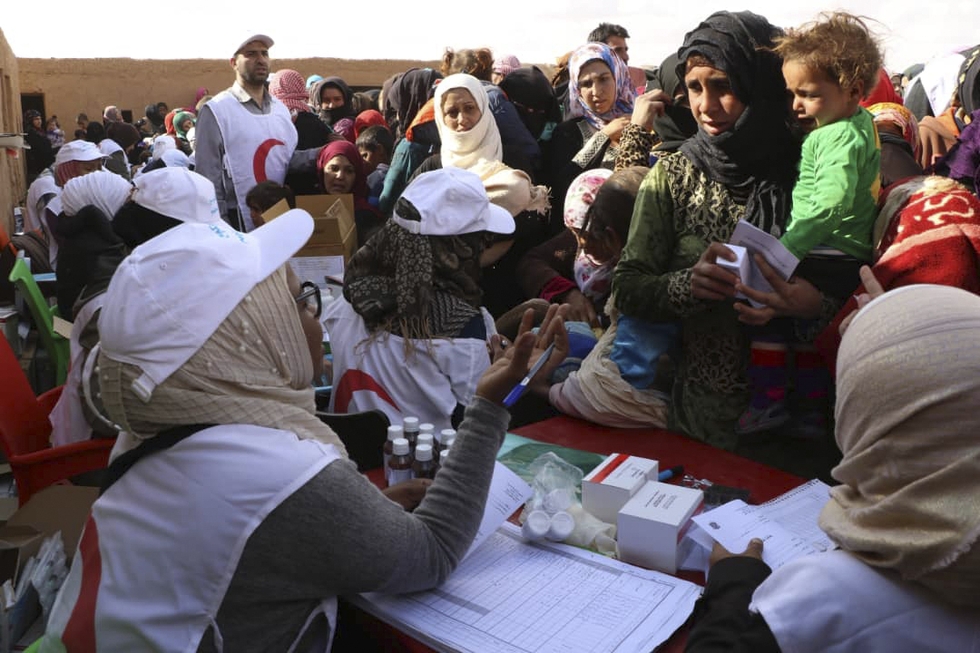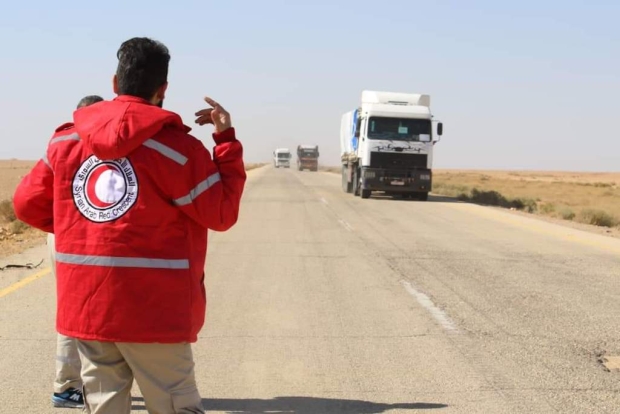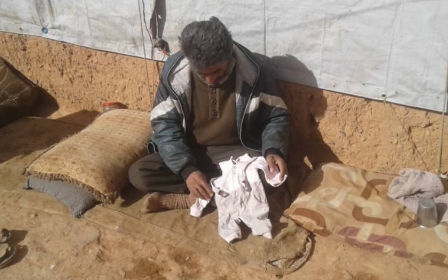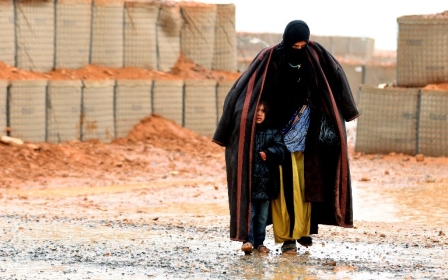Syrians in desert camp fearful after Jordan calls for Rukban to be dismantled

AMMAN - Jordan is holding three-party talks with Russia and the US aimed at dismantling the Rukban refugee camp just over the border in neighbouring Syria, as the kingdom believes conditions are right for the refugees to return to their homes.
The Jordanian minister of media affairs, Jumana Ghunaimat, told Middle East Eye that the US and Russia could help in closing the camp, but a rebel commander in the nearby Tanf base said residents feared reprisals or conscription if they went back to government-held territory.
Colonel Muhanad Talaa of the Revolutionary Commandos Army, who is in charge of Rubkan security, told MEE that some camp residents would prefer to be transferred to rebel-held areas in the north of Syria.
We have seen what happens to people who have returned to regime areas. They have been arrested, some killed and they have been conscripted into fighting with the regime
- Khaled al-Ali, media activist in Rukban
Rukban camp, which lies in the Syrian desert three kilometres north of Jordan, was established in 2015 as a gathering place for Syrians fleeing from fighting in Palmyra, rural areas of Homs, and east Hama - all of which the Syrian government now controls.
The camp currently falls under the protection of the US-led coalition against the Islamic State (IS) group, due to its proximity to the Tanf base, which the US controls in cooperation with Syrian rebels of the Jaish al-Thawra group (Revolutionary Commandos Army).
In a short time, the camp has reached a population of 50,000 inhabitants, and the Jordanian government has become increasingly anxious about its existence.
On 21 June 2016, members of IS blew up a vehicle that caused the death of seven Jordanian border patrol soldiers, leading Jordanian officials to claim that the camp had become a hub for IS.
After that incident, Jordan closed its 378km border with Syria - spelling the end of humanitarian aid deliveries and a refusal to accept any sick patients from the camp into Jordan for treatment.
As a result, the humanitarian situation in the camp has deteriorated. Earlier this month, eight children died in Rukban when sub-zero temperatures spread across the region.
Speaking at a news conference with his US counterpart Mike Pompeo on 8 January, Jordanian Foreign Minister Ayman Safadi said that Russia, Jordan and the US should discuss the repatriation of Syrians from Rukban camp, which he said "must be de-established".
A 'solution'
The Jordanian minister, Ghunaimat, told Middle East Eye that Jordan had always said Rukban was a Syrian and international issue and not Jordan's problem.
"Jordan wants a solution that ends the suffering of the inhabitants of the refugee camp, and Jordan has paid a high price with martyrs dying to support this humanitarian cause," said Ghunaimat.
"Jordanian-US-Russian talks have been initiated to find the root solution to the problem of Rukban camp. The goal of these talks is to find the proper solution that will allow for the voluntary return of the camp residents back to their homes and towns.
"Jordan believes that the current situation on the ground allows for the return of the Syrians," she insisted.
Large areas in southern and eastern Syria are now under the control of the Syrian government following the defeat of the Syrian rebels and IS in Palmyra, Deir Ezzor, Homs, Hama and Raqqa.
As such, active fighting on the ground has largely ended, and some have suggested the security situation has effectively stabilised.
It is of deep concern to us that Jordan, Russia and the US are negotiating instead of asking the inhabitants of the camp what they think, or at least having a committee from the camp attend the talks
- Colonel Muhanad Talaa, head of rebel Revolutionary Commandos Army
However, Talaa - the head of the Revolutionary Commandos Army and the person responsible for the security of the Tanf army base as well as Rukban camp - told MEE he was "not comfortable" with the prospect of Jordan, the US and Russia discussing the camp's closure.
"It is of deep concern to us that Jordan, Russia and the US are negotiating instead of asking the inhabitants of the camp what they think, or at least having a committee from the camp attend the talks," he said, adding that he was aware of the talks, but did not know "what the results were".
He said that many inhabitants feared reprisals - or mandatory conscription - from the Syrian government, while others preferred to instead go to northern regions controlled by rebels.
"There is a division within the camp between those who want to go to north Syria and those who say they will only go if there are international guarantees once they return to their areas," he said.
"We are hoping that a safe haven to north Syria is opened so we can get to the areas of the moderate opposition in Manbij and Jarablus for those who want to.
"Otherwise, those who want to stay under international protection and don't want to return to the areas under Syrian regime control should not be forced, because we fear arrest, interrogation and mandatory conscription in the Syrian army.
"People don’t want to fight on the side of the Syrian regime."
Al-Tanf situation
The announcement by US President Donald Trump in December that he would be withdrawing US forces from Syria has also complicated the situation.
A 55km de-confliction zone is in place in every direction around the US-led coalition's Tanf base, encompassing Rukban camp. The base lies on the strategic Damascus-Baghdad highway, once a major supply route from Iraq and Iran into Syria, making it a key bulwark in a larger campaign against Iranian influence in Syria.
Damascus says US forces are occupying Syrian territory and providing a safe haven in that area for rebels it deems terrorists.
In November, Russian General Mikhail Mizintsev claimed that if the US dismantled the base, it would “automatically lead to the resolution of the Rukban problem and return of its residents back to their homes”.
However, Mamoun Abu Nowar, a retired Jordanian air force major general, said it was "unlikely" that the US would give up Tanf base as it was "close to both Iraq and Syria and will surely be the base for any future American military action".
"But there is a possibility that some arrangements will be made to allow those who want to return voluntarily to do so."
Although aid reached Rukban camp in November - the first since January last year - including food, sanitation and hygiene supplies, the long-term situation of the camp is a major cause of concern; while the Jordanians have made it clear that they want to see the camp disappear completely.
Khaled al-Ali, a media activist in the camp, said that the residents were fearful for their futures.
"We have seen what happens to people who have returned to regime areas. They have been arrested, some killed and they have been conscripted into fighting with the regime," he said.
"The best solution is a safe passage to north Syria under UN auspices."
Additional reporting by Reuters.
Middle East Eye propose une couverture et une analyse indépendantes et incomparables du Moyen-Orient, de l’Afrique du Nord et d’autres régions du monde. Pour en savoir plus sur la reprise de ce contenu et les frais qui s’appliquent, veuillez remplir ce formulaire [en anglais]. Pour en savoir plus sur MEE, cliquez ici [en anglais].




